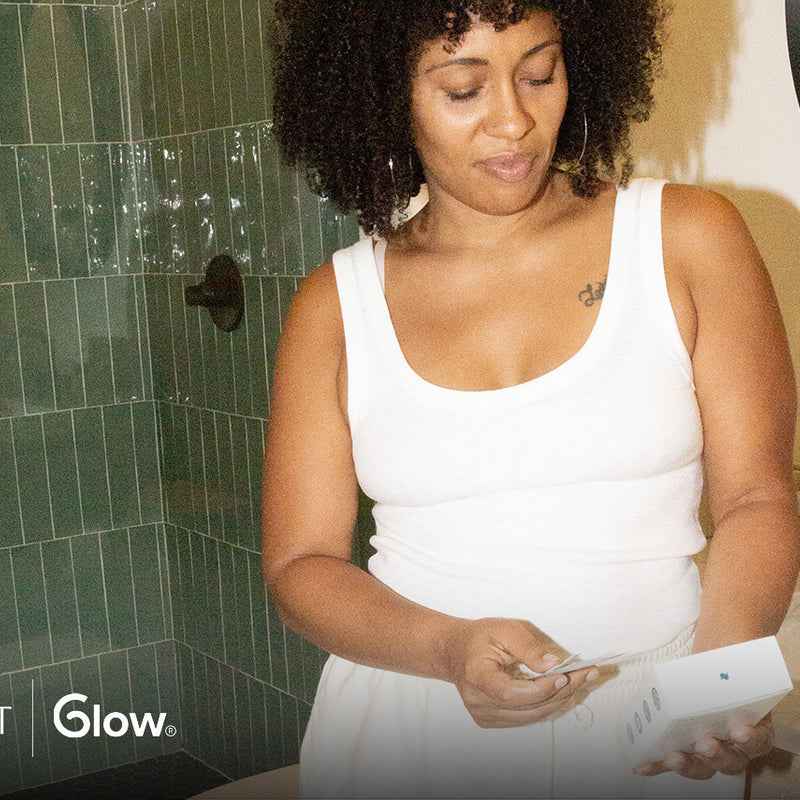How to Preserve Fertility

By Dr. Kenosha Gleaton, OBGYN and fertility expert
If you’re concerned about your future fertility, you may be considering fertility preservation methods. Whether you already have children or not, having options down the road to continue growing your family can bring you peace of mind. Let’s talk about the different ways you can preserve fertility.
What is fertility preservation?
Fertility preservation in the medical world refers to the process of saving eggs, sperm, embryos, or other reproductive tissue now for use in the future. [1] This allows singles or couples the chance to have biological children at a later date when their fertility may decline due to illness, age, or other reasons. There are a few different ways to preserve fertility based on your sex, relationship status, and family planning goals. There are also natural methods that may be helpful for prolonging fertility or supporting reproductive health.
Who should preserve fertility?
Fertility preservation may be beneficial for anyone that may want biological children in the future. Some common reasons people choose to go through fertility preservation include:
Illness
There are many different diseases and conditions that may prompt someone to think about fertility preservation. If someone is diagnosed with cancer, an autoimmune disease, genetic diseases, etc. that may impact future fertility through the progression of the illness or treatment options, choosing to preserve fertility gives them the option of using their own reproductive tissue or cells later in life. [1] Many different treatment options such as radiation or chemotherapy can damage production of sperm or may damage existing sperm and ovaries. [2-3]
Declining fertility
Some people may have been told by a healthcare provider that their fertility is declining due to age, genetics, or other factors. We know that the number of oocytes (eggs) in the body decreases steadily until about age 32, when the number decreases more significantly. [4] Egg quality also decreases with age, specifically after age 35. [4] There is a higher chance of fetal abnormalities and pregnancy complications as someone ages, which is why preserving high quality eggs earlier in life can help support a healthy pregnancy and embryo. [4]
Life events
Another common reason for fertility preservation includes basic life events. This may include basic family planning and child spacing, or could be related to mental health, work, and personal choice. If someone has the means to preserve fertility when they know they do have fertile reproductive tissue or cells, it can offer peace of mind when thinking about having kids later in life.
Fertility preservation methods
Sperm freezing
Sperm freezing or sperm cryopreservation is a way to preserve male fertility by freezing and storing semen for future use. In most cases, collecting sperm for cryopreservation is very noninvasive, however in some circumstances sperm can be surgically extracted. [5]
Egg and embryo freezing
Oocyte cryopreservation (OC) or egg freezing is the process of extracting and freezing mature eggs to use at a later time. [6] Freezing eggs or embryos requires the use of hormones and fertility drugs to stimulate the ovaries and produce multiple eggs in one cycle. [7] Eggs are then extracted by a healthcare provider and frozen by themselves or after being fertilized with partner or donor sperm. Want more details? Here’s a complete guide on egg freezing.
Gonadal shielding
Shielding is a technique used to protect the testicles and female pelvic area from harmful rays produced by radiation treatments. [1] For those battling illnesses requiring radiation treatment, a lead shield may be used or rays can be aimed at smaller areas to avoid damaging reproductive organs, sperm, or eggs. [1]
Ovarian transposition and tissue freezing
Ovarian transposition is a method only used in rare circumstances and is still considered investigational. [1] Transposition refers to the removal of large amounts of reproductive tissue to either cryopreserve or relocate to an area inside the body that will not be exposed to potentially damaging treatments. [1] This is mostly used in individuals receiving chemotherapy or radiation for cancer. Cryopreservation of ovarian tissue has also been done in prepubertal females or individuals who cannot delay treatment for cancer or other conditions. [1]
Planning for fertility preservation
Deciding to freeze eggs, sperm, embryos, or tissue can take time and money, so it’s important you plan ahead and feel confident in your decision before moving forward with medical fertility preservation.
Testing
First, you may want to know where you currently stand when it comes to fertility. An important part of trying to conceive is having adequate hormone levels as well as healthy sperm and eggs. Women’s Fertility Tests may provide some insight into your current fertility hormone levels. There are also ways to test semen and ovarian reserve from the comfort of your home. If you’re on the fence about whether or not you should be looking into cryopreservation, gaining insight into where you currently stand can be very beneficial.
Budgeting
Another piece of the puzzle is cost. It’s hard to say exactly how much fertility preservation may cost you as your insurance, location, testing, and preservation method can all impact the price. In general, one cycle of egg freezing is estimated to cost between $8,000 and $20,000. [8] Choosing to have your eggs fertilized prior to freezing may cost a bit more depending on the lab. Freezing sperm is a bit cheaper, averaging a few hundred dollars for freezing and an additional $200 to $300 a year in storage costs. [9]
You also need to consider the cost of additional treatments down the line such as IVF, which can come with a hefty price tag. [10]
Weigh your options
There are a few options when it comes to cryopreservation and it’s important that you consider them all. For example, do you want to preserve your eggs on their own, or fertilize them using sperm from a donor or partner? If you’re in a cisgendered heterosexual relationship, are you both wanting to freeze your eggs and sperm separately or together? If you’re wondering about the pros and cons of embryo freezing vs egg freezing, this article may be helpful. At the end of the day, you should move forward with whatever method makes the most sense for your future!
Natural ways to preserve fertility
Outside of medical fertility preservation, there are some natural methods that may be beneficial for supporting reproductive health.
Eat a balanced diet
A balanced diet can support health in many ways. Research shows that making some dietary choices can have a positive impact on fertility in both men and women. Maintaining a diet high in unsaturated fats, whole grains, vegetables, and fish may improve fertility. [11] It’s also suggested that those trying to conceive or focused on improving their fertility limit intake of saturated fats and sugar. [11] Additionally it’s been shown that a diet high in whole grains, soy, seafood, folic acid, vitamin D, and vitamin B12 may improve ovarian reserve in overweight women. [12]
Take supplements that support fertility
There is a wide variety of supplements on the market that aim to support fertility. A few that may be helpful for preserving reproductive health include coenzyme Q10 (CoQ10), vitamin D, zinc, and selenium.
CoQ10 is a vitamin-like supplement with antioxidant properties that has been shown to increase sperm parameters and egg health. [13-14] Vitamin D has also shown to be beneficial for egg health and maintaining ovarian reserve. [15] Selenium is an important mineral for male fertility, with studies showing that it has protective and beneficial effects on sperm health. [16] Lastly, it’s suggested that zinc is essential for maintaining the lining of reproductive organs and plays an important role in capacitation (a necessary process for sperm to be able to fertilize an egg). [17]
Avoid damaging chemicals
Bisphenol A (BPA) and phthalates are two well studied environmental toxins known as endocrine disrupting chemicals (EDCs). These toxins are routinely found in cosmetics, food and drinks, plastics, and more. Research shows that EDC exposure may lead to reduced fertility, conditions such as polycystic ovary syndrome (PCOS) or endometriosis, irregular menstrual cycles, and more. [18] To protect yourself against these harmful toxins, stick to products that are labeled as phthalate free and be sure your products don’t contain BPA, dioxins, phytoestrogens, or other EDCs. [19] You can also avoid damaging chemicals or products by reducing use of alcohol, tobacco, and other drugs. Data suggest that fertility treatments and fertility may be impacted by heavy drug and alcohol use. [20]
Know where you stand
One of the best things you can do when considering your family planning options is to know where you stand currently. Getting a read on your fertility and important hormone levels can provide insight into what preservation or treatment options you may qualify for. There are sperm testing kits to get a read on sperm parameters, blood hormone tests to measure reproductive hormones, and more. These tests can also help you start a dialogue with your healthcare provider on how to plan for growing your family in the future.
The cons of fertility preservation
While both natural and medical fertility preservation methods provide a lot of benefits, there are some negatives you should be aware of. For example, even medical preservation methods aren’t a guarantee that you will be able to have a biological child later in life. Not all frozen eggs, embryos, or sperm will survive the freezing and thawing process, and IVF is not a guarantee that pregnancy will occur. It can also be expensive to go through the process of cryopreservation or treatments such as IVF. Storage, lab, doctor, and medication fees can quickly add up and are rarely completely covered by insurance.
Key takeaways
- Fertility preservation refers to the process of saving eggs, sperm, embryos, or other reproductive tissue now for use in the future.
- There are also non-medical ways to support and prolong fertility.
- Common reasons for preserving fertility include illness, declining fertility, age, and life events.
- A few options for medically preserving fertility include freezing sperm, freezing eggs, freezing embryos, and shielding, moving, or freezing reproductive organs or tissues to avoid damage from medical interventions.
- To plan for fertility preservation you should consider your budget, find out your current hormone levels, ovarian reserve, or sperm parameters, and weigh out all of your options.
- Preserving or supporting fertility naturally can be done through diet, supplementation, and avoiding damaging chemicals or products.
References:
- What is fertility preservation? National Institutes of Health, Office of Communications. Last reviewed 1/31/2017. Accessed March 27 2023. URL.
- Waimey KE, Smith BM, Confino R, Jeruss JS, Pavone ME. Understanding Fertility in Young Female Cancer Patients. J Womens Health (Larchmt). 2015;24(10):812-818. doi:10.1089/jwh.2015.5194
- Vakalopoulos I, Dimou P, Anagnostou I, Zeginiadou T. Impact of cancer and cancer treatment on male fertility. Hormones (Athens). 2015;14(4):579-589. doi:10.14310/horm.2002.1620
- Owen A, Sparzak PB. Age Related Fertility Decline. [Updated 2022 Dec 12]. In: StatPearls [Internet]. Treasure Island (FL): StatPearls Publishing; 2023 Jan
- Sedaghat Herati A. Sperm Banking. Johns Hopkins Medicine. Accessed March 2023. URL.
- Fertility preservation: Understand your options before cancer treatment. Mayo Clinic. Dec. 06, 2022. URL.
- Embryo Freezing (Cryopreservation). Cleveland Clinic. Last reviewed 02/17/2022. URL.
- Allen N, Velasquez V. How Much Does It Cost to Freeze Eggs? Investopedia. Published October 2022. URL.
- Weingus L, Ghazal S. How Much Does It Cost To Freeze Sperm? Forbes. Dec 1, 2022. URL.
- Lake R, Velasquez V. How Much Does IVF Cost? Investopedia. September 2022. URL.
- Panth N, Gavarkovs A, Tamez M, Mattei J. The Influence of Diet on Fertility and the Implications for Public Health Nutrition in the United States. Front Public Health. 2018;6:211. Published 2018 Jul 31. doi:10.3389/fpubh.2018.00211
- Eskew AM, Bedrick BS, Chavarro JE, Riley JK, Jungheim ES. Dietary patterns are associated with improved ovarian reserve in overweight and obese women: a cross-sectional study of the Lifestyle and Ovarian Reserve (LORe) cohort. Reprod Biol Endocrinol. 2022;20(1):33. Published 2022 Feb 19. doi:10.1186/s12958-022-00907-4
- Salas-Huetos A, Rosique-Esteban N, Becerra-Tomás N, Vizmanos B, Bulló M, Salas-Salvadó J. The Effect of Nutrients and Dietary Supplements on Sperm Quality Parameters: A Systematic Review and Meta-Analysis of Randomized Clinical Trials. Adv Nutr. 2018;9(6):833-848. doi:10.1093/advances/nmy057
- Akarsu S, Gode F, Isik AZ, Dikmen ZG, Tekindal MA. The association between coenzyme Q10 concentrations in follicular fluid with embryo morphokinetics and pregnancy rate in assisted reproductive techniques [published correction appears in J Assist Reprod Genet. 2017 May;34(5):607]. J Assist Reprod Genet. 2017;34(5):599-605. doi:10.1007/s10815-017-0882-x
- Bacanakgil BH, İlhan G, Ohanoğlu K. Effects of vitamin D supplementation on ovarian reserve markers in infertile women with diminished ovarian reserve. Medicine (Baltimore). 2022;101(6):e28796. doi:10.1097/MD.0000000000028796
- Moslemi MK, Tavanbakhsh S. Selenium-vitamin E supplementation in infertile men: effects on semen parameters and pregnancy rate. Int J Gen Med. 2011;4:99-104. Published 2011 Jan 23. doi:10.2147/IJGM.S16275
- Fallah A, Mohammad-Hasani A, Colagar AH. Zinc is an Essential Element for Male Fertility: A Review of Zn Roles in Men's Health, Germination, Sperm Quality, and Fertilization. J Reprod Infertil. 2018;19(2):69-81.
- Cho YJ, Yun JH, Kim SJ, Kwon HY. Nonpersistent endocrine disrupting chemicals and reproductive health of women. Obstet Gynecol Sci. 2020;63(1):1-12. doi:10.5468/ogs.2020.63.1.1
- Endocrine Disruptors. National Institute of Environmental Health Sciences. Last reviewed March 2023. URL.
- Mínguez-Alarcón L, Chavarro JE, Gaskins AJ. Caffeine, alcohol, smoking, and reproductive outcomes among couples undergoing assisted reproductive technology treatments. Fertil Steril. 2018;110(4):587-592. doi:10.1016/j.fertnstert.2018.05.02.
Reach Out, We're Here
Have questions about your order or products? For the speediest answer, check out our FAQ section. Need something else? Come find us below.
Please keep in mind our regular business hours; Monday-Friday, 9am-5pm CT.
Customer Support
support@natalist.com
Press Inquiries
media@everlyhealth.com
Business & Partnerships
team@natalist.com
Affiliates + Influencers
team@natalist.com
Job Openings
Careers Page
























